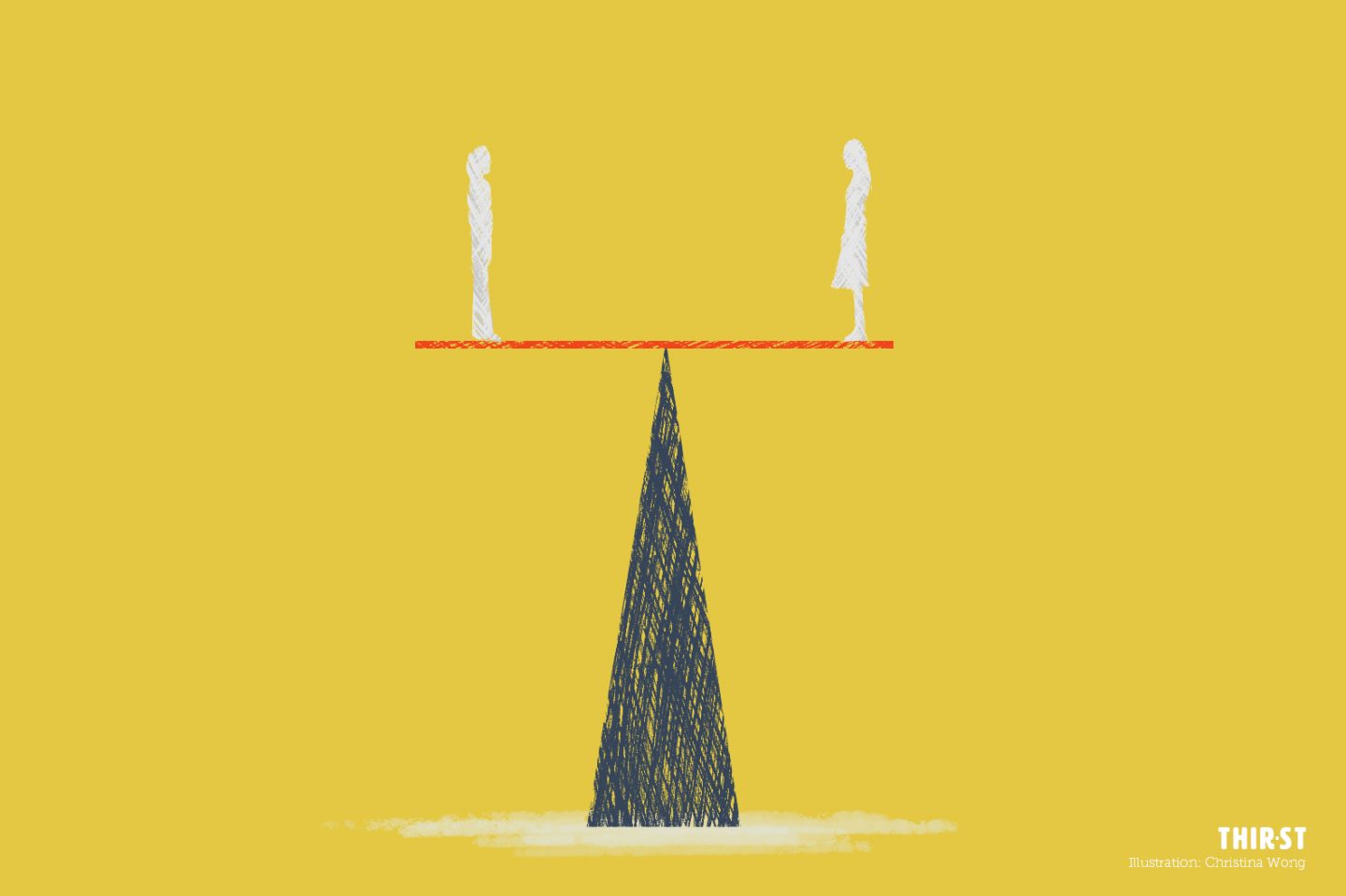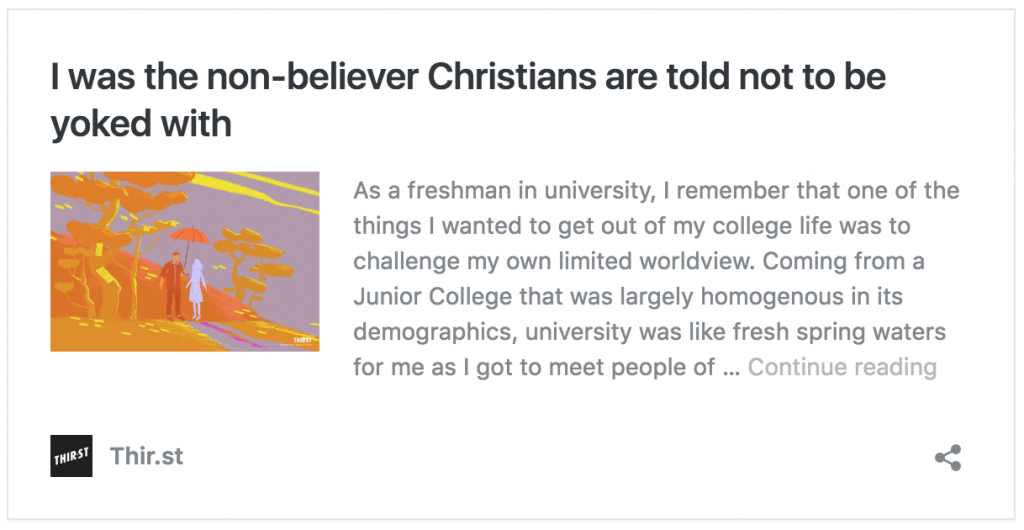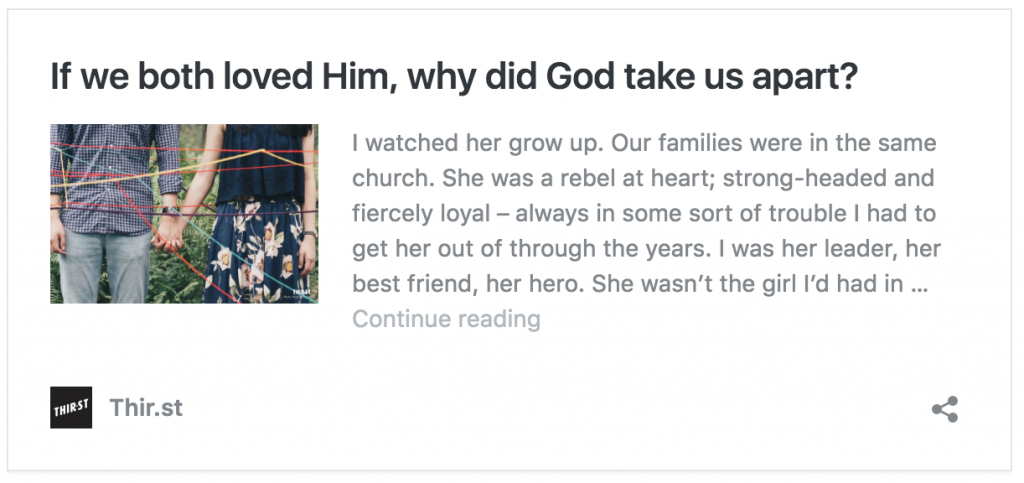When finding a mate in church, I’m often told to look for someone within the church community. The basis given for such advice is the verse, “Do not be yoked together with unbelievers” (2 Corinthians 6:14).
For those of us who don’t know what being “yoked” means, a yoke is what joins two oxen who are meant to carry a cart together. If one ox is pulling in one direction a lot more than the other, then the oxen will not be carrying the cart well – they may end up wanting to move in different directions.
This verse serves as the foundation for Christian marriage: A Christian should marry another Christian. Otherwise, you will end up with someone with a different belief and moral system – someone who doesn’t know God and will lead you away from Him.
But here’s possibly where the misconception starts: Being in an “equally yoked” relationship isn’t about the convenience of going for church service together, or being able to sing the same songs or use the same lingo.
Two professing Christians are still two broken human beings with the free will to pursue God – or not to. Simply wearing the label of Christianity does not give us a free pass to walking the three-legged race towards Christlikeness in perfect unity of mind and heart.
I am privileged to be a second-generation Christian, who grew up in church and have become well-versed in the tenets of the faith.
I know how one should behave in the church setting, and most of the answers to basic Bible study questions.
However, just because I grew up as a Christian and attend church regularly has not been the basis for my spiritual maturity. In the same vein, a believer who has not had that same privilege, and on the surface might not know all the do’s and do not’s of church etiquette, isn’t necessarily a person with less reverence for the Lord.
So it’s important to clarify something I’ve learnt: An equally yoked relationship is when a couple is united not just in faith, but in mind and heart – working well with each other, each other’s calling and most importantly with God.
Essentially, they both have the same end in mind – Christlikeness, and whatever it takes to get there.
And we know that’s not a given simply by calling oneself a Christian. Faith is not just another box in a compatibility checklist.
Funny enough, what got me thinking about all this stuff was the film, Crazy Rich Asians.
Two rich people getting married with the love and respect of great families may look like a blissful and perfect union. But that counts for little in my opinion.
Think about the other couples in the movie. There was no submission in Astrid’s marriage. She continued to live in the lap of luxury in secret, keeping this from her husband. On the other hand, her husband insisted on making it on his own to prove his worth. They were truly unequally yoked.
On the contrary, the Bible is also full of Rachel Chus – the protagonist of the film. When Jesus went to tax collector Zacchaeus’ house, everyone said He had “gone to be the guest of a sinner” (Luke 19:1-10). Rahab, the prostitute who helped the spies, eventually became the great-great-grandmother to King David (Joshua 2).
An equally yoked relationship is when a couple is united not just in faith, but in mind and heart – working well with each other, each other’s calling and most importantly with God.
Even David himself was overlooked by his own father in the search for Israel’s next king.
God then rebuked the prophet Samuel when he looked at David’s older brother Eliab and thought, “Surely the Lord’s anointed stands before the Lord.”
“When they arrived, Samuel saw Eliab. He thought, ‘This has to be the one the Lord wants me to anoint for him.’ But the Lord said to Samuel, ‘Do not consider how handsome or tall he is. I have not chosen him. For the Lord sees not as man sees: man looks on the outward appearance, but the Lord looks on the heart.’” (1 Samuel 16:7)
But the Lord told Samuel not to consider how Eliab (and the rest of David’s older brothers) looked, for He had rejected them. For the Lord does not look at the things people look at, because “people look at the outward appearance, but the Lord looks at the heart”.
And this is how we must also choose when it comes to who God desires us to be partnered with, who we can be paired with, yoked with, so that He can move the cart of our intertwined destinies forward.
In the end, even Eleanor, Nick Young’s mother who disapproved of Rachel, realises this difference between appearances and the heart.
I pray that the measure of our richness will not be wrongly determined by how often we go to church, how many Bible stories we know, or the leadership positions we hold in church – but by the fruit of the Spirit in our lives – manifested in a mutual reverence for the sovereign Lord, surrender to His will and selfless love for each other.












